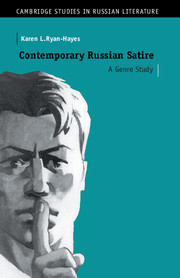Book contents
- Frontmatter
- Contents
- Acknowledgments
- Note on the translation
- Introduction
- 1 Iskander's transparent allegory: Rabbits and Boa Constrictors
- 2 Beyond picaresque: Erofeev's Moscow–Petushki
- 3 Satire and the autobiographical mode: Limonov's It's Me, Eddie
- 4 The family chronicle revisited: Dovlatov's Ours
- 5 Dystopia redux: Voinovich and Moscow 2042
- Conclusion
- Notes
- Select bibliography
- Index
- CAMBRIDGE STUDIES IN RUSSIAN LITERATURE
1 - Iskander's transparent allegory: Rabbits and Boa Constrictors
Published online by Cambridge University Press: 10 September 2009
- Frontmatter
- Contents
- Acknowledgments
- Note on the translation
- Introduction
- 1 Iskander's transparent allegory: Rabbits and Boa Constrictors
- 2 Beyond picaresque: Erofeev's Moscow–Petushki
- 3 Satire and the autobiographical mode: Limonov's It's Me, Eddie
- 4 The family chronicle revisited: Dovlatov's Ours
- 5 Dystopia redux: Voinovich and Moscow 2042
- Conclusion
- Notes
- Select bibliography
- Index
- CAMBRIDGE STUDIES IN RUSSIAN LITERATURE
Summary
Precisely because a vital life is always moving and changing, we need the orientation of something as hard as a diamond, and that is truth. It might not be the complete truth, but it can't be consciously distorted even for the sake of the grandest goal. Otherwise everything falls apart… A sailor can't get his bearings from falling stars.
Fazil′ Iskander: Rabbits and Boa ConstrictorsFazil′ Abdulovich Iskander is an extraordinary figure in contemporary Russian satire. Popular and successful as a Soviet writer, he seems to have been minimally affected by ideological pressure. He is regarded by readers and critics within the former Soviet Union and in the émigré diaspora as an enormously talented writer who managed to preserve his artistic integrity during the difficult years of the Brezhnev period. Beginning in the sixties and throughout the seventies and eighties, Iskander's poetry and prose appeared frequently in the Soviet press and in separate editions. His stories were staged, his poems were set to music, and he was awarded numerous state prizes for literature; his public readings attracted large crowds. Under the new conditions occasioned by glasnost′, he has continued to be one of the most widely read of contemporary Russian writers.
- Type
- Chapter
- Information
- Contemporary Russian SatireA Genre Study, pp. 11 - 57Publisher: Cambridge University PressPrint publication year: 1996



